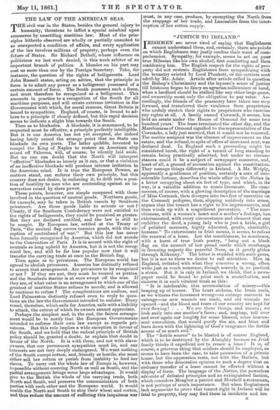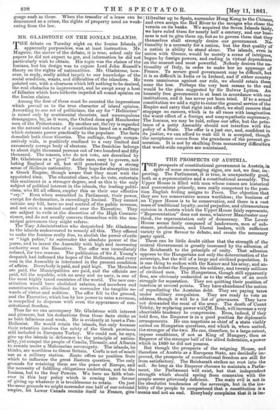"JUSTICE TO IRELAND" I RISHMEN are never tired of saying that
Englishmen cannot understand them, and, certainly, there are points on which Englishmen may justly confess their want of com- prehension. Sympathy, for example, seems to act on your true Milesian like his own alcohol, first comforting and then maddening him. The English respect for the rights of pro- perty did not restrain Englishmen from sympathizing with the tenantry evicted by Lord Plunkett, or the cottiers sent adrift by Mr. Adair. Article after article called in question the Bishop's Christianity and the layman's sense of justice till Irishmen began to fancy an agrarian millennium at band, when a landlord should be stalked like any other large game, and ownership mean only the obligation to pay rates. Ac- cordingly, the friends of the peasantry have taken one step forward, and transferred their virulence from proprietors who unduly stretch their rights to proprietors who exercise any rights at all. A family named Cormack, it seems, has held an estate under the House of Ormond for some two hundred years: The lease terminated the other day, and the Marchioness of Ormond signified to the representative of the Cormacks, a lady just married, that it would not be renewed.
The motive assigned was the absence of improvement on the estate, and the refusal, in spite of offers of increased rent, was declared final. In England such a proceeding might be considered harsh, the right of a tenant of long standing to remain being practically admitted, but under no circum- stances could it be a subject of newspaper comment, and, least of all, a ground of accusation against the constitution.
They manage things differently in Ireland. A Mr. Welply, apparently a gentleman of position, certainly a man of con- siderable fortune, describes the whole affair in the Nation in a letter occupying about six feet of type, and which, in its way, is a valuable addition to comic literature. He com- mences, of course, with a glowing description of the marriage of Miss Cormack, then diverges into two feet of narrative on the Cormack pedigree, then, slipping suddenly into sense, argues that the tenant has a right to his improvements, and then winds up with a magnificent peroration. " The mar- chioness, with a woman's heart and a mother's feelings, has. exterminated, with every circumstance and element that can embitter the deed, a young lady who is just a bride, a girl of polished manners, highly educated, gentle, charitable, humane." To exterminate in Irish means, it seems, to refuse the renewal of a lease. Let the marchioness, he continues, with a burst of true Irish poetry, " hang out a black flag on the summit of her proud castle which overhangs in frowning majesty the peaceful Nore, as it gently glides through Kilkenny." The letter is studded with such gems, but it is not to them we desire to call attention. Men in England, irritated with what they conceive a wrong, often write just as much nonsense, though scarcely in so poetical a strain. But it is only in Ireland, we think, that a news- paper could be found to print such a contribution, and endorse it in such virulent trash as this : " It is intolerable, this accumulation of misery—this heaping up of horror. The heart sickens, the brain reels, as we witness the incessant wrong—as outrage succeeds to outrage—as new wounds are made, and old wounds re- opened—and the blood and tears of our country are kept for ever flowing! . . . We see these things, and mourn ; we look sadly into one another's faces; and, mayhap, tell over and over again our longidg for some blessed, some heaven- sent convulsion, that would purify the air, and blast and burn down with the lightning of God's vengeance the fertile source of so much evil."
The "fertile source" to be blasted is of course England, which is to be destroyed by the Almighty because an Irish family thinks it expedient not to renew a lease ! It is, of course, a grievous thing that soldiers should be employed, as seems to have been the case, to take possession of a private house, but the oppression rests, not with the Butlers, but with those who demoralize opinion to such a degree that an ordinary transfer of a lease cannot be effected without a display of force. The language of the .Nation, the powerless advocate of defeated principles and an extinguished faction, which considers Meagher a patriot and Mitchell a statesman, is not perhaps of much importance. But when Englishmen lack arguments to prove that tenant right in Ireland will be fatal to property, they may find them in incidents and Ian gunge such as these. When the transfer of a lease can bei Gibraltar up to Spain, surrender Hong Kong to the Chinese, denounced as a crime, the rights of property need no weak- and even assign the Red River to the savages who chase the































 Previous page
Previous page